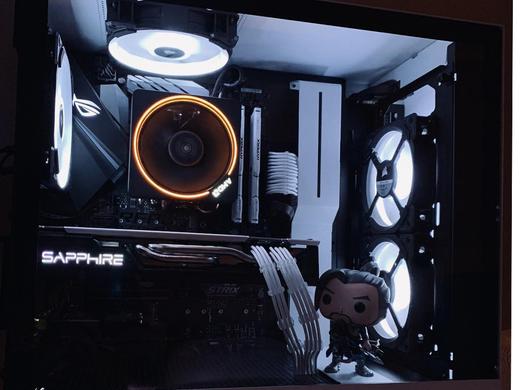Subtotal
$0.00
AIO Coolers Vs. Air Coolers – The Difference
07 March 2021 12:00
Technologies

A common question to many gamers and creators around the world is if they should go for an air cooler or an all-in-one cooler (AIO) for their build. It is quite an important choice in a PC build as the cooling solution you go for decides the amount of workload you can impose on the PC. However, before you decide on a cooling solution, you should first understand the basics of CPU cooling and the difference between the 2 most common and practical solutions: AIO and Air coolers.
How Does CPU Cooling Work?
All coolers work on a similar principle where they absorb the heat out of the CPU to redistribute it away from the hardware. All CPUs come with a metal shroud called the Integrated Heat Spreader (IHS) that serves as the initial cooling component or step in the CPU cooling process. It absorbs the heat generated by the CPU and facilitates the contact of the cooler’s baseplate via thermal paste. The heat transferred to the cooler’s baseplate is transferred away from the CPU via heat pipes or liquids to a fan where the heat is blown away from the PC.
Air Cooling
Air cooling is the most common way of cooling. All CPUs ship with a stock air cooler to facilitate their cooling process. The heat from the IHS is transferred onto the conductive baseplate and that heat is then taken away from the baseplate via attached heat pipes. These pipes take the heat onto a heatsink made of thin metal fins. These fins are designed to facilitate airflow through them and a fan blows on them to get rid of the transferred heat.
AIO/Liquid Cooling
AIO coolers or custom liquid cooling loops work similarly to the air cooling process. However, the metal baseplate of the cooler is found on its waterblock. The waterblock allows coolants to flow freely where they absorb the heat generated and flows onto a radiator to get rid of it. The flow of the coolant is facilitated by a pump (which is built-in in AIOs) and they are flown in 2 tubes/hoses. The radiator uses fans to get rid of the transferred heat.
Which is the Best Fit for You?
While a simple air cooler will work just fine in most scenarios, users might need to opt for liquid cooling in some scenarios. For example; if you are planning on overclocking your CPU clock speeds, you might want to consider a more powerful cooling solution than stock air cooling. Also if you are going to use a relatively powerful CPU on a smaller case, there might not be enough space for a powerful cooler to go with your build, hence you have no choice but to opt for an AIO. Even though AIO coolers are known to be the superior cooling solution, they come at a higher price, and not all AIOs outperform HSF (Heatsink Fan) coolers. So lookout for the coolers’ efficiency and effectiveness refering to their user feedbacks and reviews.





